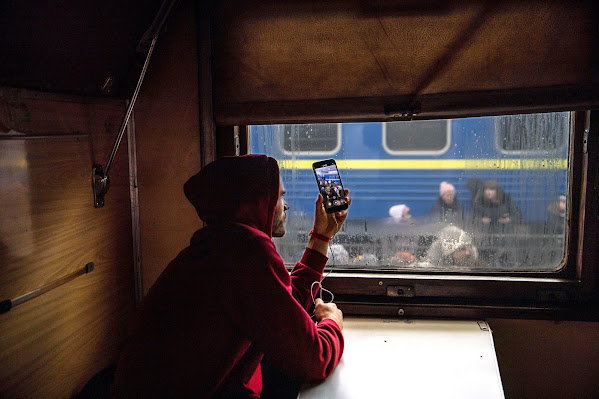''' '' TIK -TIME- TOK '' '''
FOR YEARS - TIKTOK LARGELY ESCAPED SUSTAINED scrutiny about its content. Unlike Facebook, which has been around since 2004, and YouTube, which was founded in 2005, TikTok became widely used only in past 5 years.
Owned by China's ByteDance, the app was designed to make one-to three minute videos easy to create and share. It developed a reputation as destination for the addictive, silly and fun videos especially for young users.
The app has navigated some controversies in the past. It has faced questions over the harmful ads that appeared to originate on its platform, as well as whether to allows underage users adequately protects their privacy.
But the war in Ukraine has supersized the issues facing TikTok, which has over one billion users globally.
The very features that TikTok designed to help share and record their own content have also made it easy to spread unverified videos across its platform. That includes TikTok's algorithm for its ''For You'' page, which suggests videos based on what people have previously seen, liked or shared.
OVER 597 MILLION VIEWS OF TIKTOKS with the hashtag Ukrainewar.
TikTok, the Chinese-owned video app known as viral dance and lip-syncing videos, has emerged as one of the most popular platforms for sharing videos and photos of the Russian-Ukraine war.
Over the past week, hundreds of thousands of videos about the conflict have been uploaded to the app from across the world, according to a review by The Times. The New Yorker has called the invasion ''first TikTok war.''
The surge has put TikTok in a challenging position. For the first time, it is dealing with moderating a flood of videos - many of them unverified - about a single event that has captivated a global audience.
That is leading it to essentially confront a large scale of misleading and distorted information that has long bedeviled more mature social networks and video sites, such as YouTube, Facebook and Instagram.
Many popular TikTok videos of the invasion - including some of Ukrainians livestreaming from their bunkers - offer real accounts of the action, according to researchers who study the platform.
But other videos have been impossible to authenticate. Some simply appear to be exploiting the interest in the invasion for views, the researchers said.
In one example, Pravda, a Ukrainian newspaper, posted an audio clip featuring 13 Ukrainian soldiers on Snake Island, an outpost of the Black Sea, facing a Russian military unit that asked them to surrender. The clip was then used in many TikTok videos, some of which included a note stating that all 13 soldiers had died.
Ukrainian officials later said in a Facebook post that men were alive and had been taken prisoner but the TikTok videos have not been corrected.
''There are people who are, right now, seeing war for the first time on TikTok,'' said Abbie Richards, an independent researcher who studies the app. ''People trust it. The result is that a lot people are seeing false information about Ukraine and believing it.''
TikTok and other social media platforms are also under pressure from the U.S. lawmakers and Ukrainian officials to curb Russian misinformation about the war, especially from state-baked media outlets such as Russia Today and Sputnik.
YouTube has said it would block Russia Today and Sputnik in the European Union, while Twitter and Meta, the parent of Facebook, have said they would label content from the outlets as state-sponsored.
TikTok has also banned Sputnik and Russia Today in the European Union, and on Friday it said it would start labeling the outlets as state-sponsored in the countries where they are still available.
The app also said last Thursday that it had dedicated more resources to monitoring for misleading content about the war.
''We continue to respond to the war in Ukraine with increased safety and security resources to detect emerging threats and remove harmful misinformation,'' said Hilary McQuaide, a TikTok spokeswoman. On Sunday, TikTok said it would suspend livestreaming and new content being uploaded from Russia.
''Video is the hardest format to moderate for all platforms,'' said Alex Stamos, the director of the Stanford Internet Observatory and a former head of security at Facebook.
''When combined with the fact that TikTok's algorithm is the primary factor for what content a user sees, opposed to friendships or follows on the big U.S. platforms, this makes TikTok a uniquely potent platform for viral propaganda.''
MS. HERNANDEZ, the student in Los Angeles, said she was surprised to learn from a Times reporter that some TikTok videos she had viewed about the war were misleading and unreliable.
''I guess I don't really know what war looks like,'' she said. ''But we go to TikTok to learn about everything, so it makes sense we would trust it about this, too.''
Student Hernandez added that TikTok remained her preferred platform for news. Most of what she sees on the app, she said, was real.
The Honour and Serving of the Latest Global Operational Research on War and Social Media platforms, continues. The World Students Society thanks author Sheera Frenkel.
With respectful dedication to the Students, Professors and Teachers of the world. See Ya all prepare and register for Great Global Elections on The World Students Society : wssciw.blogspot.com and Twitter - E-!WOW! - The Ecosystem 2011 :
SAM Daily Times - the Voice of the Voiceless

.png)


0 comments:
Post a Comment
Grace A Comment!